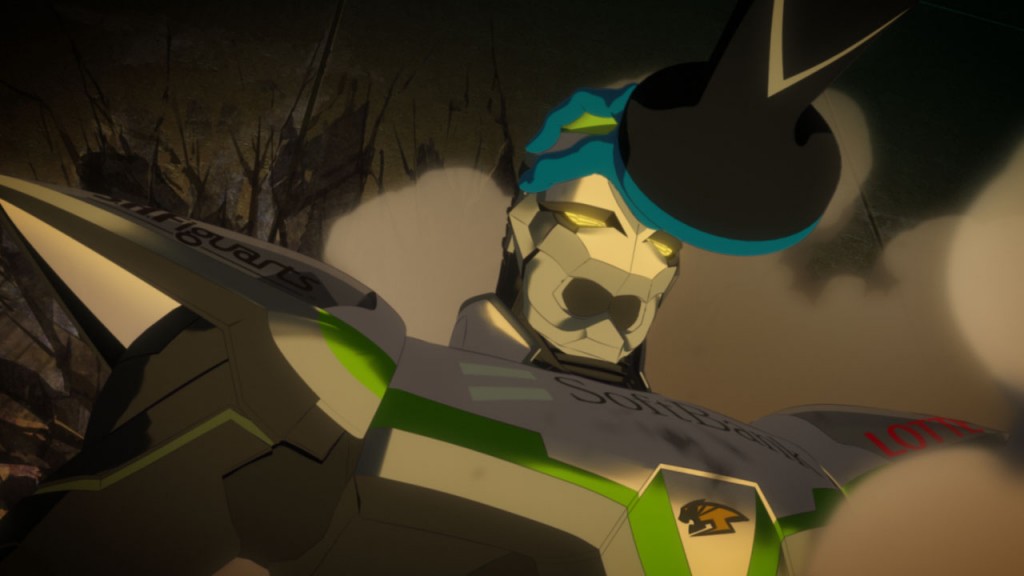Review: Tiger & Bunny: The Rising (2014)
There’s a self-aware energy to Tiger & Bunny: The Rising that makes the film seem almost parodic. It’s full of superheroes racing each other to arrest criminals and save civilians on a popular game show known as HeroTV. The heroes sport popular brand names like Pepsi and Domino’s Pizza on their outfits. They’re completely aware that if people didn’t treat their heroic exploits like sporting events, they wouldn’t have the financial backing to buy their fancy suits and pay for the citywide damage they cause. But Tiger & Bunny: The Rising is also too earnest in its exploration of heroism to be an entirely cynical exercise. It’s a fun film that lacks the grace of other animes but still captures the giddy energy of superheroics in an age when the multiplex is oversaturated with such fare.
Tiger & Bunny: The Rising follows the washed-up Kotetsu Kaburagi (Hiroaki Hirata), known to the world as the superhero Wild Tiger. Able to boost his strength 100 times that of a normal human being, Tiger used to be one of the greats, but lately, him and his younger partner Barnaby “Bunny” Brooks Jr. (Masakazu Morita) are relegated to the HeroTV Second League. The Second League is comprised of subpar heroes with mostly useless powers, like being able to spray saltwater and shoot poison needles that cause enemies to itch profusely. Tiger and Bunny are too good for their league, and their sponsor eventually notices this and puts up the cash to get them back into the premier division. But there’s a catch.
Young and talented, Bunny is a star on the rise, but Tiger’s only half the hero he used to be and he’s perfectly happy not having to devote so much of his life to heroics. Their sponsor decides to partner Bunny with a new hero, the gravity-bending Golden Ryan (Yuichi Nakamura), while leaving Tiger out in the cold. The Second League is disbanded and Tiger finds himself a hero without a job. That is, until a trio of supervillains start wreaking havoc that references an ancient Goddess legend, and then even washed-up heroes like Tiger are needed to defend the city.
Tiger’s journey is familiar to these types of hero stories. He’s past his prime but still has the moral code that makes him a valuable hero, especially when partnered with the physically-capable, but often egotistical Bunny. He’s a single father who struggles to connect with his growing daughter. In a funny moment at a train station, he rushes forward to hug his daughter, but she repeatedly dodges out of his grasp, embarrassed by his enthusiasm. Eventually Tiger finds new pride is his abilities, but it’s not in his transformation from has-been to hero of the city that the film shines. Tiger & Bunny is most interesting when it explores its heroes flaws. More often than not, it’s in small moments, not action sequences, that this happens.
There’s a scene 20 minutes into Tiger & Bunny: The Rising where three premier heroes, Sky High (Go Inoue), Rock Bison (Taiten Kusonoki), and Origami Cyclone (Nobuhiko Okamoto), are having a drink in the bar after successfully stopping criminals earlier in the day. They reflect on Tiger’s loss of a job and ponder what his obsolescence means for their futures. Sky High, the crowned “King of Heroes,” confesses that even he finds himself overly concerned with what people think of him, obsessing over catch phrases and slogans to counterbalance his insecurity. He knows he’s different than normal people and does what he does so as to fit in. As genetic mutants known as N.E.X.T.s these heroes see themselves as freaks. No amount of heroism can take away their feeling of personal inadequacy.
This examination of the superhero as outsider is embodied by Fire Emblem (Kenjiro Tsuda), a flamboyantly gay hero with a knack for pyrotechnics. After falling into a coma, the film shows Fire Emblem running over his own past in his mind and the moments when his homosexuality left him feeling ostracized by the world. We witness his memories of the first time he expressed his attraction for other boys or cross-dressed openly in the streets. After Tiger & Bunny: The Beginning where Fire Emblem was nothing more than a gay stereotype callously used for comic relief, it’s refreshing to see the character given some depth and agency.
Of course, this level of self-reflection often gets lost in the action sequences, where Tiger & Bunny: The Rising sweeps aside introspection in favour of video game-inspired smackdowns. The second hour of the film is essentially one extended action sequence. While often exciting, such an onslaught of action can grow exhausting. As well, the 3D animation used to depict many of the heroes powers in the action scenes blends uneasily with the traditional animation used throughout. It lacks a graceful seamlessness. The film would have done better to stick to traditional animation and sacrifice some of the flair.
Of course, that’s overlooking the fact that Tiger & Bunny: The Rising is greatly concerned with flair. Be sure to watch Tiger & Bunny: The Beginning before venturing into The Rising, as knowledge of the franchise is a must to understand the relationships and plot details upon which the film is built. But with that knowledge, Tiger & Bunny: The Rising becomes an easy film to enjoy, full of genial heroics and colourful characters. It’s best when it digs deeper and examines the outsiders at its centre, but its general theatrics succeed more often than not.
6 out of 10
Tiger & Bunny: The Rising (2014, Japan)
Directed by Yoshitomo Yonetani; written by Masafumi Nishida; starring Hiroaki Hirata, Masakazu Morita, Minako Kotobuki, Go Inoue, Kenjiro Tsuda, Mariya Ise, Taiten Kusunoki, Nobuhiko Okamoto, and Yuichi Nakamura.
